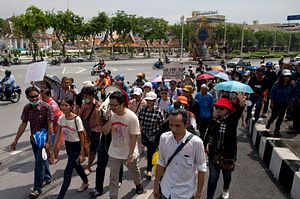I was a university student on May 22, 2014 when Thailand’s military overthrew a democratically elected government — my country’s 13th coup d’état since the creation of a parliamentary monarchy in 1932. On that day, in a Bangkok classroom, several of my classmates and I decided we had to act. We formed a group to fight for democracy and advocate for human rights of all Thai citizens. We secretly organized peaceful pro-democracy demonstrations. We spoke out against abuses.
But we all have paid a price.
The police and military crushed one demonstration after another. Most of us have faced interrogations and prosecutions. In 2015, I was arrested and charged with sedition. A military court sent me and 13 other activists to prison for almost two weeks. In a women’s prison in Bangkok, I was forcibly given a painful, humiliating cavity search. I still face several sedition charges today.
This past March, my country held its first elections in five years. The deeply flawed election process was designed to ensure a military lock on power — and it delivered. In July, General Prayut Chan-o-cha, the coup-maker and head of state for the past five years, was reinstalled as an “elected” prime minister. He slid into power thanks to support from military-party parliamentarians and 250 members of the Senate, all of whom were appointed, not elected
Instead of condemning the election as farce and the new government as illegitimate, the U.S. government appears to have moved toward rewarded the new Thai government with a State Department designation that it is civilian and democratically elected. Since the 2014 coup, U.S. law had barred Washington from providing military assistance to Prayut and his military junta. But now, the U.S. government is moving to restore military ties. Orders have already been made for armored vehicles, machine guns, and other military equipment.
Worse still, because the unelected Thai Senate will serve until 2024, the current government could hold on to power for eight more years. Thai citizens can’t even change our own constitution because doing so requires approval of at least 84 Senators — impossible because all were appointed by Prayut and remain his supporters.
Meanwhile, human rights abuses have continued since the March election. In recent months, several activists have been assaulted by gangs linked to the junta. In June, a broad daylight attack sent one democracy activist to an intensive care unit.
Last week, I traveled to the United States to tell government policymakers that despite this year’s “elections,” Thailand is no democracy. Non-violent activists like me continue to be violently attacked and persecuted.
On September 20, I returned to Thailand, where five fellow activists and I were scheduled to appear before the country’s Criminal Court to hear the verdict in one of the sedition cases against me. We were acquitted this time, but I am still facing three other sedition cases as well as other charges. If convicted on the remaining sedition charges, I could be jailed for over 20 years.
How can Washington claim to support democracy in Thailand, while it is now restoring military assistance, thereby emboldening our abusive military — the very institution that is undermining democratic values? Junta rule has not really ended. Almost all junta laws and decrees enacted during the dictatorship remain in effect and will soon be turned into law. For example, authorities have the power to detain individuals for up to seven days without any judicial oversight.
The United States should be pressuring the Thai government today, not cozying up to it. The U.S. Congress should be strengthening support of Thai civil society and pro-democracy activists. The U.S. government’s “free and open Indo-Pacific strategy” should be made less about government-to-government ties and more about strengthening civil society in Southeast Asia, where many freedoms are still heavily restricted. At the same time, U.S. lawmakers should start considering legislation restricting military assistance to Thailand unless it makes clear progress in loosening its crackdown on dissent and making progress towards true democratic rule.
We have waited five years for democracy and human rights to return to Thailand. We are still waiting.
Chonthicha Jangrew is a co-founder of the Democracy Restoration Group, a Thai pro-democracy group. The Thai government has filed multiple criminal charges against her, including charges of sedition, for her peaceful protest activities.

































